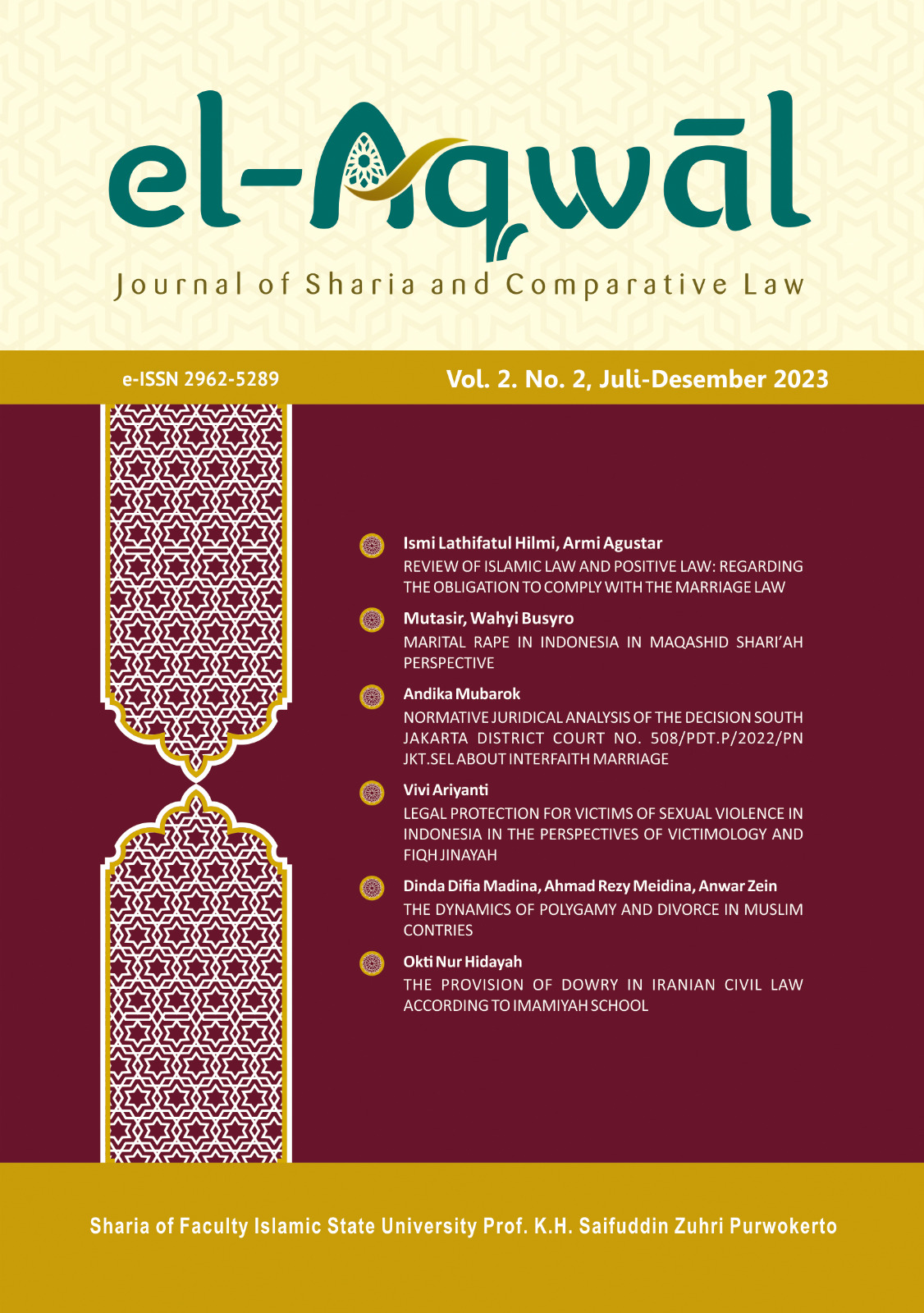Legal Protection for Victims of Sexual Violence in Indonesia in the Perspectives of Victimology and Fiqh Jinayah
DOI:
https://doi.org/10.24090/el-aqwal.v2i2.9411Keywords:
Legal Protection, Victims, Sexual Violence, Victimology, JinayahAbstract
Sexual violence is a global problem that violates human rights and fundamental freedoms. This paper examines the laws and regulations that guarantee the protection of victims according to Indonesian laws and Islamic law. Regarding Indonesian laws, besides the basic rules in the form of the Act on the Crime of Sexual Violence, there are also ministerial regulations (Regulation of the Minister of Education and Culture, and Regulation of the Minister of Religion) that protect and guarantee the safety of everyone from sexual violence offences. This is the concern of higher education institutions, that they are on the right track to address the issue of sexual violence with more passion and precision. The issues of sexual violence have received greater attention in universities, so that intensive prevention and response efforts are very important, with the aim of combating sexual violence in universities, navigating the application of laws and regulations relating to sexual violence, and more broadly, fostering a culture of respect, inclusion and courtesy towards others. These national laws are in line with the Islamic precepts regarding protection of citizens in the maqasid al-shariah concept, in which sexual violence offences can fall into all three categories of jarimah: qisas, hudud, and ta'zir, depending on the type of crimes committed.Downloads
References
Abdurrachman, Hamidah et al. “Application of Ultimum Remedium Principles in Progressive Law Perspective”, International Journal of Criminology and Sociology, 10, 2021: 1012–1022. https://doi.org/10.6000/1929-4409.2021.10.119
Amborski, Amylee Mailhot, et al. “Sexual Violence Against Persons with Disabilities: A Meta-Analysis”, Trauma, Violence, and Abuse, Vol. 23 (4), 2021: 1330–1343. https://doi.org/10.1177/1524838021995975
Arief, Barda Nawawi. “Perlindungan Korban Kejahatan dalam Proses Peradilan Pidana”, Jurnal Hukum Pidana dan Kriminologi, Vol. 1, No.1, 1998.
Ariyanti, Vivi. “Konsep Perlindungan Korban dalam Sistem Peradilan Pidana Nasional dan Sistem Hukum Pidana Islam”. Al-Manahij: Jurnal Kajian Hukum Islam 13 (1), 2019: 33-48.
Auda, Jasser. Maqasid Al-Shariah as Philosophy of Islamic Law: A Systems Approach. London: International Institute of Islamic Thought, 2022.
Bedera, Nicole. “Beyond Trigger Warnings: A Survivor-Centered Approach to Teaching on Sexual Violence and Avoiding Institutional Betrayal”, Teaching Sociology, 49 (3), 2021: 267–277. doi:10.1177/0092055x211022471
Doerner, William G.; dan Lab, Steven P. Victimology, sixth edition. Amsterdam: Elsevier, 2012.
Eddyono, Sri Wiyanti. ‘Dilema Reformasi Hukum Kekerasan Seksual dan Perlindungan Korban’, Kompas. Jakarta, 21 Agustus 2019.
Foubert, John D., et al. “Sexual Violence at Christian and Secular Universities: Does Institutional Type Matter?”. Christian Higher Education 20 (4), 2021: 257-270. DOI: doi.org/10.1080/15363759.2020.1806143
Gunarto, Marcus Priyo. Terorisme dalam Prespektif Hukum Pidana dan Kriminologi. Yogyakarta: Genta Press, 2012.
Hasan, Muhammad Tholchah. Islam dalam Perspektif Sosial Budaya. Malang: Galasa Nusantara, 2019.
Irfan, Nurul, and Masyrofah. Fiqh Jinayah. Jakarta: Amzah, 2019.
Irianto, Sulistyowati. “Kekerasan terhadap Perempuan dan Hukum Pidana: Suatu Tinjauan Hukum Berperspektif Feminis”, Jurnal Perempuan 8 (10), 1999: 10.
Kementerian PPPA. “UU TPKS berikan perlindungan lebih bagi penyandang disabilitas”, Kementerian Pemberdayaan Perempuan dan Perlindungan Anak, 17 Juni 2022, https://www.kemenpppa.go.id/index.php/page/read/29/3951/uu-tpks-berikan-perlindungan-lebih-bagi-penyandang-disabilitas
Kifli, Susiana Kifli, and Ismail, Atika. “Analisis Hak Korban Korban Kekerasan Seksual dalam Rancangan Undang-Undang Penghapusan Kekerasan Seksual dalam Perspektif Hukum Positif dan Hukum Islam”, Jurnal Wajah Hukum 6(2), 2022.
Komnas Perempuan. “Laporan Ringkas Kajian Disabilitas (Pemenuhan Hak Perempuan Disabilitas Korban Kekerasan Seksual: Capaian Dan Tantangan)”, Komnas Perempuan, 2022. https://komnasperempuan.go.id/pemetaan-kajian-prosiding-detail/laporan-ringkas-kajian-disabilitas-pemenuhan-hak-perempuan-disabilitas-korban-kekerasan-seksual-capaian-dan-tantangan.
Maula, Bani Syarif. “Implementasi Pengarusutamaan Gender dalam Kurikulum Fakultas Syariah Perguruan Tinggi Keagamaan Islam”. Equalita: Jurnal Studi Gender dan Anak 2 (2), 2020: 164-181.
Mendes, Kaitlynn, et al. “Sexual violence in contemporary educational contexts”. Gender and Education 34 (2), 2022: 129-133. DOI: doi.org/10.1080/09540253.2022.2032537
Napolitano, Janet. “Only Yes Means Yes: An Essay on University Policies regarding Sexual Violence and Sexual Assault”, Yale Law and Policy Review 37, 2015: 387.
Pandangan Jogja. “Derita Penyandang Disabilitas Korban Perkosaan: Pengin Seks Terus”. Kumparan.com, 20 April 2022.
Parra-Barrera, Sandra M., et al. “Protection against Sexual Violence in the Colombian Legal Framework: Obstacles and Consequences for Women Victims”. International Journal of Environmental Research and Public Health, 18(8), 2021: 4171. doi:10.3390/ijerph18084171
Pusch, N., and Holtfreter, K. “Sex-Based Differences in Criminal Victimization of Adolescents: A Meta-Analysis”. J Youth Adolescence 50, 2021: 4–28. https://doi.org/10.1007/s10964-020-01321-y
Rahardjo, Satjipto. Hukum Progresif: Sebuah Sintesa Hukum Indonesia. Yogyakarta: Genta Publishing, 2009.
Rahardjo, Satjipto. Penegakan Hukum Progresif. Jakarta: Penerbit Buku Kompas, 2010.
Shalihah, Fithriatus. Sosiologi Hukum. Jakarta: Rajawali Press, 2017.
WHO. Global and regional estimates of violence against women: Prevalence and health effects of intimate partner violence and non-partner sexual violence. New York: World Health Organization, 2013.
Yulia, Rena. Viktimologi Perlindungan Hukum terhadap Korban Kejahatan. Yogyakarta: Graha Ilmu, 2010.
Downloads
Published
How to Cite
Issue
Section
License
Copyright (c) 2023 Vivi Ariyanti

This work is licensed under a Creative Commons Attribution-ShareAlike 4.0 International License.
Authors who publish with this journal agree to the following terms: Authors retain copyright and grant the journal right of first publication with the work simultaneously licensed under a Creative Commons Attribution-ShareAlike 4.0 International License that allows others to share the work with an acknowledgment of the work's authorship and initial publication in this journal.












